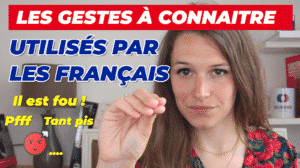Transcription of video on French slang
Wesh brother, what's with the look? It's really embarrassing.
Have you understood nothing of what I've just said?
Don't worry, it's normal. I used mostly slang words.
Today we're going to look at 20 slang words, 20 expressions that are used a lot by young people in France, and to help you, you'll find in the description, you can download a sheet that includes these words, an explanation and a contextualization.
So feel free to download it in the description.
The aim of this video is for you to know these words so that you can understand them if you watch French-language shows on TV, if you watch recent series or films, or if you follow, for example, influencers on TikTok or Instagram who might use these words.
Before I start, I'd like to thank the partner of this video, Lingopie. I've already told you about this streaming platform that lets you learn French through video content, series and TV shows in French.
I tell you very often, learning French in a context helps you retain vocabulary in the long term.
You choose a series, for example "Fais pas ci, fais pas ça", and you can set the subtitles in French. When you're not sure about a word, you can click on it.
The word will then be added to the vocabulary you want to learn and revise. You'll then have games to help you revise this vocabulary, and each time you can review it in context.
There are also other useful features to help you progress, such as mach up subtitles. You have subtitles in English or in your own language, and key words, the most important words, are displayed in French.
Lingopie offers a range of very affordable subscriptions, but right now you'll get a discount of minus 70% for lifetime access.
If you're interested, you can follow the link in the description, and you also get seven days free to test this tool, to see if it's right for you.
🚀 Transform your understanding of French IN 15 MINUTES A DAY
60 dialogues to boost your understanding of French 🇫🇷
Let's get back to our slang words and expressions.
The first is the word "brother".
You okay, brother? Yeah yeah, I'm fine, I'm fine, a little bit, bro. What's going on, bro? Go ahead, tell me.
The word brother normally refers to someone in your family. For example, I have two brothers.
But very often, young people use the word "brother" as a synonym for "friend". And very often, they even use it as an interjection to address someone, to address a friend.
For example, I can say, "You don't get it, bro. You need to watch this video again."
"Wesh. This word comes from Arabic, I think.
Originally, we just used it to say "hello".
"Wesh, you okay?"
But more and more, it's being used at any time, in sentences.
"Wesh, I hooked up with a chick last night. Wesh, we eating Greek? Totally, wesh."
It's a way of punctuating sentences. It's become a bit of a synonym for "what".
For example, I might say, "The appointment's at 11:30 wesh, why is she asking me if I've arrived yet? It's only 10:00."
A crush.
A crush is someone you like.
We'd like him to be more than a friend. We have a bit of a crush on this person. For example, I might say, "I have a crush at work and a crush at the gym. I don't know which I like better."
My mother's life. You may have heard this one before, when someone gets upset. For example, if someone is trying to do something, but can't, they might say, "My mother's life, I'll never make it."
My mother's life is driving me crazy. That dog there, burst there.
It's an expression used to express very strong emotion. It's become a bit of a synonym for "p*tain".
My mother's life, it's not very polite, so don't use it, obviously, at work. You can also use it to swear, to promise something.
My mother's life, it's true. My mother's life that I'm going to sign pro. I swear.
Strong.
Strong is normally an adjective used to describe someone who is powerful, who has a lot of muscle. He's strong.
He can carry four packs of water. But more and more, young people have hijacked this word and use it instead of "yes, really".
For example, if I say, "How would you like to have pizza tonight?", "Strong. I've been craving pizza for a week."
So, you see, that means "yes, really" that really says a lot to me. "Did you like that film?", "Very much. It was extraordinary."
"You're scared."
Or "You're scared", normally used when you're frightened. For example, I saw a horror film and got scared. But we use it a lot, or at least young people use it a lot, to talk about something that's really wrong.
For example, if I post a photo of myself on social networks with my hair dishevelled, because I've just woken up, I could put "a hairstyle, you're scared." to say that there's nothing wrong.
"Slammed to the ground."
Something slammed on the floor is something really bad. It's really low quality. My guy is really slammed to the ground. He didn't get me anything for my birthday. My guy is my boyfriend, my lover. Again, it's a slang word.
"Tej someone or get tej'd"
If someone says to you "I've been tej'd?" it means they've either been dumped or left, so they're no longer in a relationship, they're single.
The person he was with left him. Or it could mean he got fired from his job. "I got tej from my company." Or you can simply use it to say that you've been asked to leave.
For example, "I got tej from McDonald's, I'd been there for four hours. They told me to clear the table."
Embarrassment.
We use embarrassment to refer to a situation in which we're embarrassed or ashamed.
For example, I might say, "My dad told my boyfriend again about all the stupid things I did as a kid. The embarrassment."
I was embarrassed. I was embarrassed by the situation.
The draw.
A person's appearance is their look, their appearance, their physical appearance, but more related to their clothes.
It could be her style of dress or her hairstyle.
We can say that someone has a good look to say that they have a good style, but often, we also use it in a negative way to say "What's that look?" to say "How are you dressed? What kind of style is that?"
To have fun.
When someone says to you, "Tonight, I'm getting drunk," it means they're planning to have a good time. It's kind of a synonym for partying. If I say, "We're going to have fun tonight," it means, "We're going to have a good time, we're going to party. Often, when we're having fun afterwards, we can get hungry and want to eat.
Grit.
It's a synonym for eat. Perhaps you're familiar with the word "bouffer", which is very common in colloquial language. We use it almost every day. Bouffer and de la bouffe. But young people also use the word grailler.
I don't have much time for lunch, so I'll just grab a sandwich.
Pranker, a prank.
It's a word that's come up in recent years and that we see a lot on social networks.
It means to make a joke, to play a prank. It's a synonym for hoax.
For example, we all pranked our boss into thinking we were leaving the office at 3:00.
Very often, pranks are filmed and made to be broadcasted on social networks.
"Y pas à".
If you hear someone say, for example, there's no need to get so worked up. It means, don't, it's not worth it. For example, if I want to put my dog's coat on and he moves around a lot, and doesn't want me to put it on him, I can tell him "there's no need to move around like that".
We will see two words at the same time.
Tema and a rat.
Tema and a rat.
You may have seen this trend on social networks.
"Tema, the size of a rat. Tema is verlan. It's language... It's an inverted word. Normally, it's mate.
"Mater" is also slang for "to watch".
So "Look" becomes "Mater" in slang and "Téma" in verlan.
It means "look".
"Look at how my sister is dressed." To say "look at how my sister is dressed. She's super underdressed."
And a rat is normally an animal, but we're not talking about the animal here.
When we speak of a rat, in colloquial language we're talking about someone who's cheap, someone who doesn't like to spend a lot of money, who wants to keep his money.
When we say "Tema the size of the rat," we mean "Look at what a cheapskate this person is."
Here's an ad you can see in the Paris metro for Canal+, a TV channel. It's called Rat+.
They mean it's really an offer for big cheapskates. They put underneath "The size of the offer".
It's an offer that will appeal to everyone, even the stingiest shoppers.
Poucave.
A poucave is a snitch. Again, a snitch is a slang word, but nowadays, young people use the word poucave a bit more. When someone poaches you, it means they're telling on you.
You can use it as a verb or as a noun. I'm a louse, I told my mother that my sister went out behind her back.
I lost my sister to my mother.
The darlings, the daron or the daronne.
These are words that young people use a lot. They're slang words for parents. Le daron, the father, la daronne, the mother and les darons, the parents.
I'm going to work at my daron's tonight. I'm going to eat at my dad's tonight.
The seum.
I'm sure you've heard this one before. When you've got the shakes, it means you're drunk, you're disgusted. This is the tenth time I've played Loto this month and I still haven't won.
You can also say "I've got the shits" to say that you're angry or upset with someone.
I've got a bad feeling about him, he forgot our appointment.
Relou.
Relou, I've already talked about in other videos, but it's used almost every day in France, so it's important to review it. Relou is the verlan for heavy. It's used to talk about someone or a situation that's boring or annoying. C'est relou, it's the subway strike all over again. I'm fed up with it.
That's it, the video is over. I hope you enjoyed it, and that you were able to learn more words about this second language in French, which is slang. If you'd like to learn more expressions, check out my latest article 50 French slang words with examples (maj 2023)
In the description, you'll find a card with these words, an explanation and a context, so don't hesitate to download it.
If you are interested in Lingopie, the partner of this video, this streaming platform that allows you to watch movies, series or shows in French, you also have the link in the description.
See you soon for a new video.








